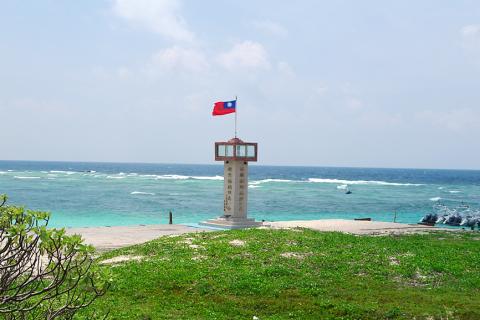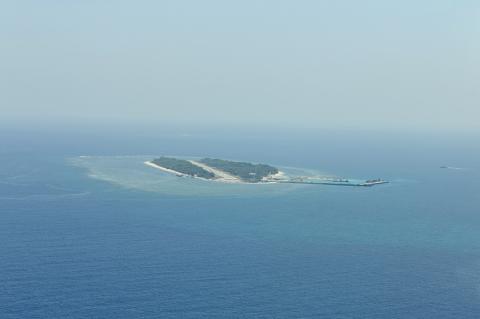The Coast Guard Administration and the Ministry of National Defense plan to conduct humanitarian rescue exercises on Itu Aba Island (Taiping Island, 太平島) tomorrow, as part of President Tsai Ing-wen’s (蔡英文) promise to turn the island into a humanitarian aid and resupply base, an official said yesterday.
The official, who declined to be named, said that exercises are intended to be a “soft” reassertion of national sovereignty over the island, increasing international awareness without increasing tensions in the South China Sea through “muscle flexing” focused on military power.
Coast Guard Director-General Lee Chung-wei (李仲威) is to attend, the official said.

Photo: Luo Tien-pin, Taipei Times
Tsai declared the island would become a humanitarian rescue center on July 19 after the Permanent Court of Arbitration in The Hague ruled it was legally a “rock,” and therefore not entitled to an exclusive economic zone.
The Coast Guard Administration’s Pratas Islands (Dongsha Islands, 東沙群島) and Spratly Islands (Nansha Islands, 南沙群島) commands have provided numerous forms of emergency medical and humanitarian aid since the agency in 2000 assumed the duty of sending personnel to the islands, the official said, adding that agency statistics showed a total of 70 cases of assistance involving 100 people.
Government statistics showed that international humanitarian aid on the part of the Pratas Islands Command comprises the greatest single category of cases, including 25 incidents comprising 43 people.

Photo provided by a visitor to the island
The Spratly Islands Command based on Itu Aba most recently aided three Taiwanese fishing boats which had run out of fresh water and applied to dock and resupply, the official said, adding that a member of one crew also received medical treatment for cellulitis in his lower leg.
A more urgent case occurred two years ago when a Chinese fishing boat applied for medical assistance after two crew were severely injured when a lift broke.
One crew member was already dead by the time the boat arrived, while the other had several internal injuries to his waist and back.
After cleaning and dressing his wounds and determining his condition was stable, he was sent back to the boat and returned to China, the official said.

Taiwanese can file complaints with the Tourism Administration to report travel agencies if their activities caused termination of a person’s citizenship, Mainland Affairs Council Minister Chiu Chui-cheng (邱垂正) said yesterday, after a podcaster highlighted a case in which a person’s citizenship was canceled for receiving a single-use Chinese passport to enter Russia. The council is aware of incidents in which people who signed up through Chinese travel agencies for tours of Russia were told they could obtain Russian visas and fast-track border clearance, Chiu told reporters on the sidelines of an event in Taipei. However, the travel agencies actually applied

New measures aimed at making Taiwan more attractive to foreign professionals came into effect this month, the National Development Council said yesterday. Among the changes, international students at Taiwanese universities would be able to work in Taiwan without a work permit in the two years after they graduate, explainer materials provided by the council said. In addition, foreign nationals who graduated from one of the world’s top 200 universities within the past five years can also apply for a two-year open work permit. Previously, those graduates would have needed to apply for a work permit using point-based criteria or have a Taiwanese company

The Shilin District Prosecutors’ Office yesterday indicted two Taiwanese and issued a wanted notice for Pete Liu (劉作虎), founder of Shenzhen-based smartphone manufacturer OnePlus Technology Co (萬普拉斯科技), for allegedly contravening the Act Governing Relations Between the People of the Taiwan Area and the Mainland Area (臺灣地區與大陸地區人民關係條例) by poaching 70 engineers in Taiwan. Liu allegedly traveled to Taiwan at the end of 2014 and met with a Taiwanese man surnamed Lin (林) to discuss establishing a mobile software research and development (R&D) team in Taiwan, prosecutors said. Without approval from the government, Lin, following Liu’s instructions, recruited more than 70 software

Taiwanese singer Jay Chou (周杰倫) plans to take to the courts of the Australian Open for the first time as a competitor in the high-stakes 1 Point Slam. The Australian Open yesterday afternoon announced the news on its official Instagram account, welcoming Chou — who celebrates his 47th birthday on Sunday — to the star-studded lineup of the tournament’s signature warm-up event. “From being the King of Mandarin Pop filling stadiums with his music to being Kato from The Green Hornet and now shifting focus to being a dedicated tennis player — welcome @jaychou to the 1 Point Slam and #AusOpen,” the